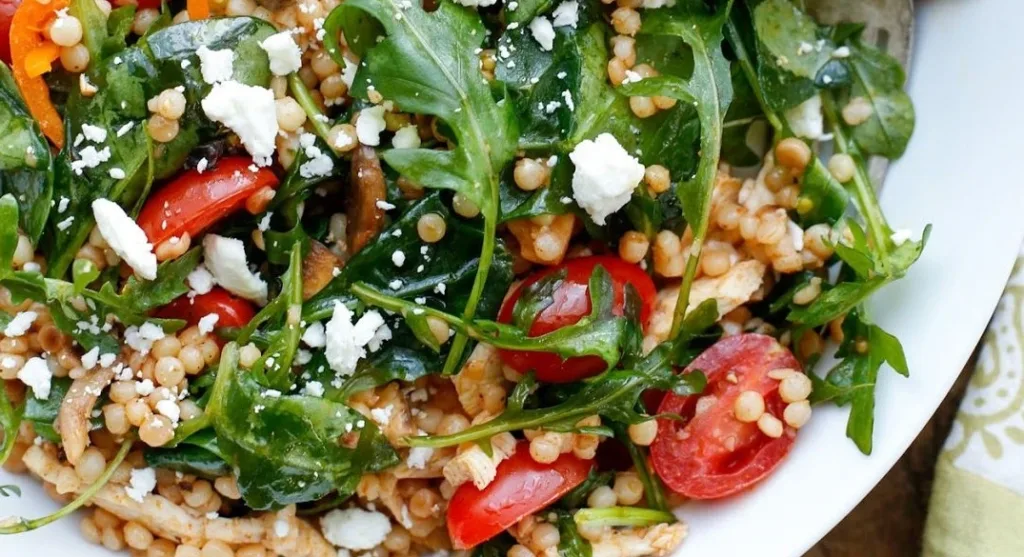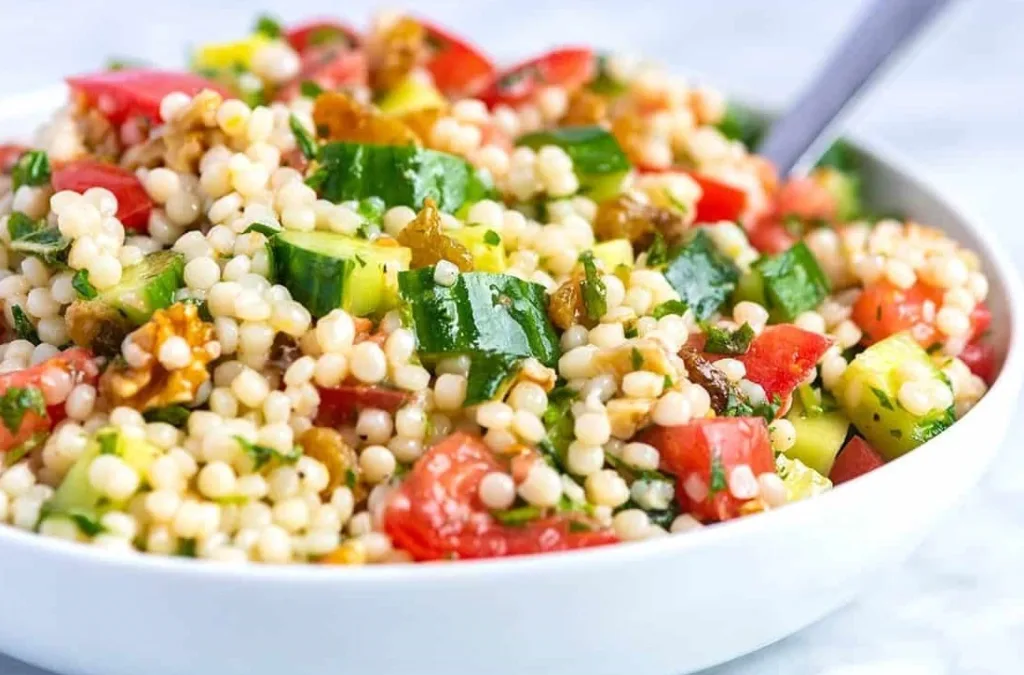Greek Couscous Salad is the epitome of a light, refreshing, and healthy dish that’s packed with vibrant flavors and nutrients. Combining the nutty texture of couscous with the freshness of classic Greek ingredients like olives, feta cheese, and fresh vegetables, this salad is perfect for any occasion, whether it’s a quick lunch or a side dish at a summer barbecue.

History of Couscous
Couscous has its roots in North African cuisine, where it has been a staple for centuries. Traditionally made from semolina wheat, couscous was brought to other parts of the Mediterranean, including Greece, through trade and cultural exchange. Over time, it became integrated into various Mediterranean diets, where it is now enjoyed in many forms. The fusion of Greek flavors with couscous creates a delightful blend that’s both satisfying and nutritious.
Key Ingredients in Greek Couscous Salad
What makes this food stand out is its combination of fresh, wholesome ingredients that come together to create a symphony of flavors:
- Couscous: The base of the salad, couscous provides a soft, fluffy texture that absorbs the flavors of the dressing and vegetables beautifully.
- Fresh Vegetables: Juicy tomatoes, crunchy cucumbers, and colorful bell peppers add a fresh and crisp bite to the salad.
- Olives and Feta Cheese: Essential to Greek cuisine, Kalamata olives offer a briny contrast, while feta cheese adds creaminess and tang.
- Herbs and Spices: Oregano, mint, and parsley bring a burst of freshness and Mediterranean flair.
- Lemon and Olive Oil Dressing: A simple yet flavorful dressing made from freshly squeezed lemon juice and extra virgin olive oil ties everything together with a zesty finish.
Types of Couscous
Couscous comes in different forms, each bringing its own unique texture and flavor to the dish:
- Traditional Couscous: Small, fine grains that cook quickly and fluff up nicely.
- Israeli Couscous (Pearl Couscous): Larger, rounder grains that have a chewy texture, often used for a heartier salad.
- Whole Wheat Couscous: A healthier option made from whole grains, offering more fiber and nutrients.
- Gluten-Free Couscous Options: Made from gluten-free grains like corn or quinoa, these are ideal for those with gluten sensitivities.
Health Benefits of Greek Couscous Salad
is not only delicious but also packed with health benefits:
- High in Fiber and Nutrients: The vegetables, couscous, and herbs provide a good dose of fiber, vitamins, and minerals, contributing to overall health.
- Low in Calories and Fat: Despite its rich flavors, this salad is light and won’t weigh you down.
- Rich in Antioxidants: Ingredients like tomatoes, cucumbers, and olive oil are full of antioxidants that help fight inflammation and support heart health.
- A Good Source of Plant-Based Protein: Couscous and vegetables provide protein, making this salad a great option for vegetarians.
Step-by-Step Guide

Making Greek Couscous Salad is simple and straightforward. Here’s how you can do it:
- Preparing the Couscous: Start by cooking the couscous according to the package instructions. Once cooked, fluff it with a fork and let it cool.
- Chopping the Vegetables: Dice tomatoes, cucumbers, bell peppers, and red onions into small, bite-sized pieces.
- Mixing in Olives and Feta: Add Kalamata olives and crumbled feta cheese to the couscous and vegetables.
- Making the Lemon and Olive Oil Dressing: Whisk together fresh lemon juice, extra virgin olive oil, a pinch of salt, and pepper.
- Combining All Ingredients: Pour the dressing over the couscous mixture and toss until everything is evenly coated.
Variations of Greek Couscous Salad
While the classic version is hard to beat, there are several delicious variations you can try:
- Mediterranean Couscous Salad with Chickpeas: Add protein-packed chickpeas for a heartier salad that’s perfect for vegetarians.
- Greek Couscous Salad with Grilled Chicken: Top the salad with slices of grilled chicken breast for a satisfying meal.
- Vegan Greek Couscous Salad: Omit the feta cheese and add more vegetables or a vegan cheese alternative.
- Spicy Greek Couscous Salad with Harissa: Mix in a dollop of harissa paste for a spicy kick that enhances the salad’s flavors.
Serving Suggestions for Greek Couscous Salad
This versatile salad can be served in various ways:
- As a Light Lunch or Dinner: It’s filling enough to be enjoyed as a main course, especially during the warmer months.
- As a Side Dish for Barbecues and Picnics: Greek Couscous Salad pairs well with grilled meats, making it an ideal side for outdoor gatherings.
- Pairing with Grilled Meats and Seafood: Serve it alongside grilled lamb, chicken, or fish for a complete Mediterranean meal.
Tips and Tricks for the Best Greek Couscous Salad
For a perfect Greek Couscous Salad every time, keep these tips in mind:
- Choosing the Best Quality Ingredients: Fresh, high-quality ingredients make a huge difference in flavor.
- Balancing the Flavors: Adjust the amount of lemon juice, olive oil, and herbs to suit your taste.
- Achieving the Perfect Texture: Ensure the couscous is fluffy and not clumpy by fluffing it with a fork after cooking.
Common Mistakes to Avoid
Even though Greek Couscous Salad is easy to make, there are a few common pitfalls to avoid:
- Overcooking the Couscous: Follow the cooking instructions carefully to avoid mushy couscous.
- Overloading with Dressing: Use just enough dressing to coat the ingredients without making the salad soggy.
- Using Too Much Feta or Olives: Both feta and olives have strong flavors, so use them in moderation to avoid overpowering the dish.
Storing and Making Greek Couscous Salad Ahead
One of the great things about this salad is that it can be made in advance:
- How to Store in the Refrigerator: Store the salad in an airtight container and keep it in the fridge for up to 3 days.
- How Long It Stays Fresh: Greek Couscous Salad tastes best when fresh, but it can last for a couple of days in the fridge.
- Making It Ahead for Meal Prep: This salad is ideal for meal prepping. Just add the dressing right before serving to keep it fresh.
Greek Couscous Salad for Special Diets
Couscous Salad can be easily adapted to suit various dietary needs:
- Gluten-Free Greek Couscous Salad: Use gluten-free couscous or substitute with quinoa for a similar texture.
- Low-Carb Couscous Salad: Opt for cauliflower couscous to reduce the carbs while keeping the flavor.
- Keto-Friendly Modifications: Replace couscous with chopped, lightly cooked vegetables to stay within keto guidelines.
Pairing Greek Couscous Salad with Beverages
To complete the meal, consider pairing your salad with these beverages:
- Best Wines to Complement the Salad: A crisp white wine like Sauvignon Blanc or a light rosé pairs beautifully with the salad’s fresh flavors.
- Non-Alcoholic Options: Homemade lemonade or iced tea are refreshing choices that go well with the salad.
- Herbal Teas to Pair with Couscous Salad: Mint or chamomile tea can enhance the salad’s Mediterranean feel.
Why Greek Couscous Salad Is Perfect for Summer
Greek Couscous Salad is especially enjoyable during the summer months:
- Light and Refreshing Qualities: The combination of fresh vegetables and zesty dressing makes it a cooling, satisfying dish for hot days.
- Easy to Make and Transport: It’s a breeze to prepare and can be easily packed for picnics or beach outings.
- Ideal for Outdoor Gatherings: Whether it’s a barbecue or a casual get-together, this salad is a crowd-pleaser that complements any summer menu.
Conclusion
Greek Couscous Salad is a versatile and delicious dish that can be enjoyed in countless ways. Whether you’re making it as a quick meal or serving it at a party, its fresh, vibrant flavors are sure to impress. So go ahead and experiment with different ingredients and variations—you might just find your new favorite salad!
FAQs
Can I use quinoa instead of couscous?
Yes, quinoa is a great substitute and adds a slightly nuttier flavor, along with more protein.
How do I keep the couscous from getting mushy?
Cook the couscous according to package instructions and fluff it with a fork immediately after cooking.
Is Greek couscous salad good for weight loss?
Yes, it’s low in calories and fat, making it a great option for a healthy, balanced diet.
Can I add other vegetables to the salad?
Absolutely! Feel free to add or substitute any vegetables you like, such as roasted zucchini or artichokes.
How long does Greek couscous salad last in the fridge?
It can last up to 3 days if stored properly in an airtight container.

2 thoughts on “Greek Couscous Salad: A Refreshing Mediterranean Delight”